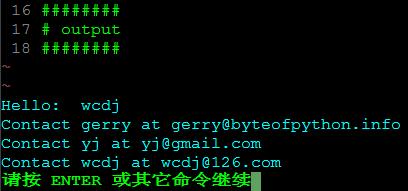Python在函數中使用*和**接收元組和列表
阿新 • • 發佈:2017-05-11
eight argument ron err 由於 .net 表示 方法 class
[4] 註意普通參數與*和**參數公用的情況,一般將*和**參數放在參數列表最後。
[元組的情形] [Python] view plain copy print?
當要使函數接收元組或字典形式的參數 的時候,有一種特殊的方法,它分別使用*和**前綴 。這種方法在函數需要獲取可變數量的參數 的時候特別有用。
[註意]
[1] 由於在args變量前有*前綴 ,所有多余的函數參數都會作為一個元組存儲在args中 。如果使用的是**前綴 ,多余的參數則會被認為是一個字典的健/值對 。
[2] 對於def func(*args):,*args表示把傳進來的位置參數存儲在tuple(元組)args裏面。例如,調用func(1, 2, 3) ,args就表示(1, 2, 3)這個元組 。
[3] 對於def func(**args):,**args表示把參數作為字典的健-值對存儲在dict(字典)args裏面。例如,調用func(a=‘I‘, b=‘am‘, c=‘wcdj‘)
[4] 註意普通參數與*和**參數公用的情況,一般將*和**參數放在參數列表最後。
[元組的情形] [Python] view plain copy print?
- #! /usr/bin/python
- # Filename: tuple_function.py
- # 2010-7-19 wcdj
- def powersum(power, *args):
- ‘‘‘‘‘Return the sum of each argument raised
- to specified power.‘‘‘
- total=0
- for i in args:
- total+=pow(i,power)
- return total
- print ‘powersum(2, 3, 4)==‘, powersum(2, 3, 4)
- print ‘powersum(2, 10)==‘, powersum(2, 10)
- ########
- # output
- ########
- powersum(2, 3, 4)==25
- powersum(2, 10)==100
[字典的情形]
[python]
- #! /usr/bin/python
- # Filename: dict_function.py
- # 2010-7-19 wcdj
- def findad(username, **args):
- ‘‘‘‘‘find address by dictionary‘‘‘
- print ‘Hello: ‘, username
- for name, address in args.items():
- print ‘Contact %s at %s‘ % (name, address)
- findad(‘wcdj‘, gerry=[email protected], /
- wcdj=[email protected], yj=[email protected]
在gvim中的輸出結果:
http://blog.csdn.net/delphiwcdj/article/details/5746560
Python在函數中使用*和**接收元組和列表
